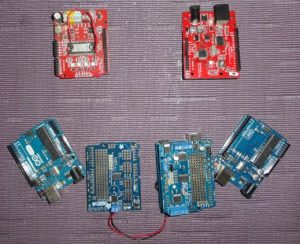Practical laboratory experience is essential for linking together theory and practice. So that the professor has to exert enormous effort to design experiment/s that can inspire students to do critical thinking and become problem solvers.
Take this experience as example, while searching for mechatronics experiments, the professor experienced several difficulties across different mechatronic systems; issues crop up like; install, use, learn, understand, maintain, expensive, host-platform dependent and lack of write-ups. As a result, the professor faces a number of headaches, worst of which is wasting invaluable time trying to teach students how to use these mechatronics system.
All these problems are address with the introduction of the Arduino development platform (caveat: I’m writing about it, but not endorsing it). An open source (meaning free on certain conditions) platform, the student use their own computer, download the reference manual and software-development tools from the Arduino website, install it with little to no hassle at all on any host platform (e.g., Mac OSX, Windows, Linux). After a few minutes of installation, the student can immediately connect to the embedded development board via USB, compile and download an example program and get instant output via blinking LED from the arduino board. The true benefit of this design is that an embedded systems beginner (the student) can focus their attention on learning how to build the hardware and write the software to interface with peripheral devices they wish to create or prototype.
With this setup, schools no longer need to spend money on a dedicated yet expensive embedded mechatronics lab furthermore, students can practice on their own phase at home.
In 2013, the professor decided to try the Arduino development environment in replacement of “older” mechatronics experiments.

Unfortunately, at the start of the semester, there were no suitable lecture notes for presenting general knowledge covering the course program using Arduino platform. As a result, the professor collected and created some notes which eventually transformed into this work. He have relied on his industry experience with before mechatronics its instrumentation and control, to provide students with fundamental, yet general knowledge of creating embedded hardware and software using Arduino.
Hopefully, this will result in students learning the core concepts of mechatronics that they can reapply on future projects where they are likely to work on different processors.
The professor’s experiment/workshop will inspire students to explore this fast-growing technology where mechanical, electronics and software collide. That Mechatronics !
Not only that, the experience at the end of the experiment/workshop, students are required to work hard and make their own project that may involve any of the following:
- Consumer devices in all fields (health, fitness, travel…)
- Gadgets / Toys of the new generation …. maybe drones ?
- Consumer devices that have ecosystems
- Assistive device for PWDs
- Media and Entertainment i.e. VRs anyone ?
- Robotics, Bionics, Cybernetics
- Mobile Appliances
- Green technology devices
- Neuro tech of any kind ……. that mind control devices
- Crazy stuff as it might work !